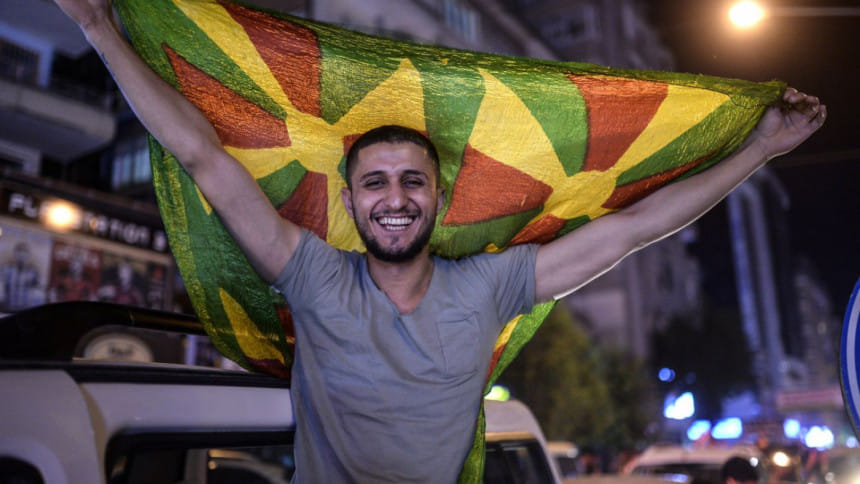A surprise Kurdish win

An unexpected victory by the Kurdish Peoples' Democratic Party (HDP) in the Turkish elections; in fact, the HDP leadership itself seems somewhat taken aback by this surprising turn of events. Indeed, a recent edition of The Economist carried a piece where it predicted the ruling AKP to win. The AKP has lost its majority in parliament, first time in 13 years. That said Tayyip Erdogan's party has won 255 seats that leaves it short of 21 seats to form a majority government. Although party insiders have told the press that the AKP will not form a coalition, and rather let a minority government take power hoping that it fails to govern leading up to an early election. Whatever may be the case, the latest polls have established one basic fact and that is that the polls remain free and fair.
So, what went wrong? Could it have anything to do with the unbridled nationalistic fervour of the AKP in the run up to the elections? Critics have long pointed out that Mr. Edogan's attempts to portray his opponents as stooges of the West appear to have backfired. The merry use of words like the "crusader" and "jewish lobbies" to undermine Turkey's one national party appear to have run out of steam. The bombing of a HDP rally in Diyarbakir killing two and wounding hundreds of people did little to dampen that party's win, which took around 80 seats. Edogan's efforts to amend the country's constitution to create a super-presidency with wide ranging executive powers received lukewarm support among the electorate.
Fear of an all-powerful president is something that is more common in dictatorships rather than democracies and that was yet another nail in the coffin for the AKP. The general sidelining of the Kurds in Turkey politically has not served the AKP well. While aiming to play a greater role in the region, Mr. Edogan was loathe to support Kurds against the IS since his party is opposed to any notion of a free Kurdish state, which would inevitably involve Turkish territory.
HDP's campaign on the other hand focused on defending rights of all those groups that felt they were going to be marginalised by a two-thirds win by the AKP – a win that would enable Edogan to bring about constitutional changes, particularly endorsing his vision of a supreme Presidency with sweeping powers. The HDP was successful in appealing to women, the ethnic minorities (other than Kurds) to the transgendered and bisexual, lesbian and gay communities, all of whom had a lot to fear from an overwhelming AKP win.
As pointed out in a recent article in The Guardian titled 'Turkey election: ruling party loses majority as pro-Kurdish HDP gains seats': The HDP success marked a sea-change likely to have a big impact on national politics. Shackled by the high threshold, pro-Kurdish candidates had previously run as independents in single seats to try to beat the 10% party barrier. But the HDP also successfully sought to reach beyond Turkey's roughly 20% Kurdish population, attempting to woo centre-left and secular voters disillusioned with Erdoğan. "The reason the HDP has won this many votes is because it has not excluded any members of this country, unlike our current rulers," said 25-year-old Siar Senci. "It has embraced all languages, all ethnicities and members of all faiths and promised them freedom."
At the end of the day, there are lessons to be learnt here. The seeds of secularism sown by Kemal Ataturk, by the founding father of modern Turkey appear to have produced generations of offspring who appear to value a system that separates the State from religion. Today's Turkey is a vibrant nation where diversity in race, creed and lifestyle are tolerated. There is no denying the fact that Mr. Edogan has done wonders for the economy in his 13 year stint. Yet somewhere down the line, changes seem to have crept in his leadership style. Opposition groups have been bullied into silence, freedom of the press challenged with the imprisonment of editors resulting in Turkey plummeting to No. 149 out of 180 countries for press freedom, just above Russia and Venezuela (according to a survey by Reporters Without Borders). The clampdown on the judiciary when investigations on the inner coterie of AKP's corruption surfaced were all indicative of a more authoritative style of governance – something that seemed oddly out of place in a democratic country.
There is no reason to treat the AKP as a spent force. It won over 40 per cent of the vote and can be re-elected to power in a future election in the event it does not opt for a coalition government. What is hoped of course is that party will introspect on where it went wrong with its voter base as opposed to blaming everything on outside influences. At the end of the day, the AKP has no one else to blame but itself for the disappointment at the polls.
The writer is Assistant Editor, The Daily Star.

 For all latest news, follow The Daily Star's Google News channel.
For all latest news, follow The Daily Star's Google News channel. 



Comments